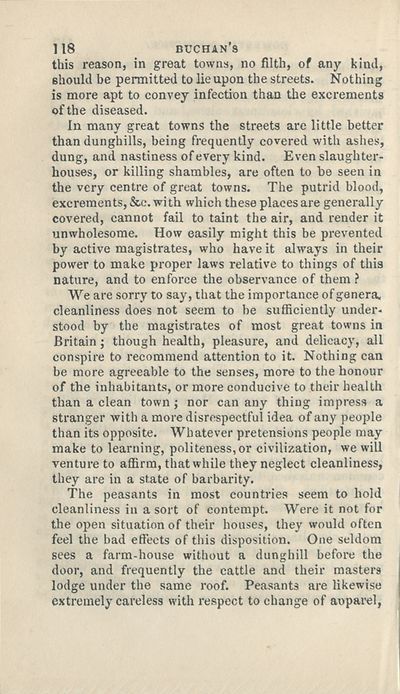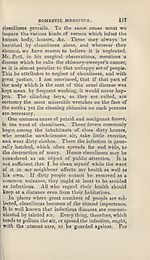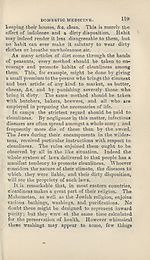Diseases > Domestic medicine
(152)
Download files
Complete book:
Individual page:
Thumbnail gallery: Grid view | List view

] 18 bcchan's
this reason, in great towns, no filth, of any kind,
should be permitted to lie upon the streets. Nothing
is more apt to convey infection than the excrements
of the diseased.
In many great towns the streets arc little better
than dunghills, being frequently covered with ashes,
dung, and nastiness of every kind. Even slaughter¬
houses, or killing shambles, are often to be seen in
the very centre of great towns. The putrid blood,
excrements, &c. with which these places are generally
covered, cannot fail to taint the air, and render it
unwholesome. How easily might this be prevented
by active magistrates, who have it always in their
power to make proper laws relative to things of this
nature, and to enforce the observance of them ?
We are sorry to say, that the importance of genera,
cleanliness does not seem to be sufficiently under¬
stood by the magistrates of most great towns in
Britain; though health, pleasure, and delicacy, all
conspire to recommend attention to it. Nothing can
be more agreeable to the senses, more to the honour
of the inhabitants, or more conducive to their health
than a clean town; nor can any thing impress a
stranger with a more disrespectful idea of any people
than its opposite. Whatever pretensions people may
make to learning, politeness, or civilization, we will
venture to affirm, that while they neglect cleanliness,
they are in a state of barbarity.
The peasants in most countries seem to hold
cleanliness in a sort of contempt. Were it not for
the open situation of their houses, they would often
feel the bad effects of this disposition. One seldom
sees a farm-house without a dunghill before the
door, and frequently the cattle and their masters
lodge under the same roof. Peasants are likewise
extremely careless with respect to change of aoparel,
this reason, in great towns, no filth, of any kind,
should be permitted to lie upon the streets. Nothing
is more apt to convey infection than the excrements
of the diseased.
In many great towns the streets arc little better
than dunghills, being frequently covered with ashes,
dung, and nastiness of every kind. Even slaughter¬
houses, or killing shambles, are often to be seen in
the very centre of great towns. The putrid blood,
excrements, &c. with which these places are generally
covered, cannot fail to taint the air, and render it
unwholesome. How easily might this be prevented
by active magistrates, who have it always in their
power to make proper laws relative to things of this
nature, and to enforce the observance of them ?
We are sorry to say, that the importance of genera,
cleanliness does not seem to be sufficiently under¬
stood by the magistrates of most great towns in
Britain; though health, pleasure, and delicacy, all
conspire to recommend attention to it. Nothing can
be more agreeable to the senses, more to the honour
of the inhabitants, or more conducive to their health
than a clean town; nor can any thing impress a
stranger with a more disrespectful idea of any people
than its opposite. Whatever pretensions people may
make to learning, politeness, or civilization, we will
venture to affirm, that while they neglect cleanliness,
they are in a state of barbarity.
The peasants in most countries seem to hold
cleanliness in a sort of contempt. Were it not for
the open situation of their houses, they would often
feel the bad effects of this disposition. One seldom
sees a farm-house without a dunghill before the
door, and frequently the cattle and their masters
lodge under the same roof. Peasants are likewise
extremely careless with respect to change of aoparel,
Set display mode to:
![]() Universal Viewer |
Universal Viewer | ![]() Mirador |
Large image | Transcription
Mirador |
Large image | Transcription
| Antiquarian books of Scotland > Diseases > Domestic medicine > (152) |
|---|
| Permanent URL | https://digital.nls.uk/119889966 |
|---|
| Description | Thousands of printed books from the Antiquarian Books of Scotland collection which dates from 1641 to the 1980s. The collection consists of 14,800 books which were published in Scotland or have a Scottish connection, e.g. through the author, printer or owner. Subjects covered include sport, education, diseases, adventure, occupations, Jacobites, politics and religion. Among the 29 languages represented are English, Gaelic, Italian, French, Russian and Swedish. |
|---|

